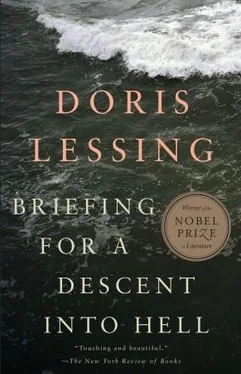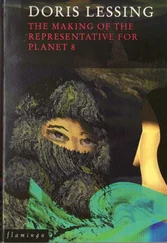Down in the village some smoke went up into the blue. There was no one to be seen. It was absolutely silent. Yet the village was occupied, and we knew that two weeks ago a dozen people had been shot in the main street. They had sent supplies to the Partisans, and for this adventure today, people might be killed, if we bungled it. But things continued to go well.
Soon a dozen women came up from the village into the field, taking their time about it. They picked up their hoes where they had dropped them. Konstantina now had a hoe and worked with the rest. I could have sworn that she was working for the pleasure of it, remembering peace and village life. She slowly hoed her way to the edge of the field, and in a moment had dropped the hoe and rolled in beside me. Under her full skirts were suspended parcels of bread, meat, sausage, even eggs. Her aunt went past, her hoe rising and falling; a package flew into the bush where we lay hidden, and I reached up to grab the precious medical supplies off the branches, like a fruit. By then Konstantina was out of her peasant woman’s garb and was a soldier again. She threw the bundle of clothes back into the field; and after a swift good-bye, good-bye, between her and the woman hoeing not six feet away, we were off and away. The raid was a success. There were no consequences to the villagers. And before that winter our people routed the enemy and the village became itself again.
We stowed the goods carefully about us. We were now heavily laden, and it was hard to walk lightly, as we had to. We had about ten miles to go before meeting up with our group, which we knew to be making its way to a peak which we could see straight in front of us. But between us and this peak were lower mountains, rivers, valleys. It was not an easy ten miles.
When we had gone about half way, we stopped on the flank of a mountain before the one we were making for. It was now midafternoon. The sun was in front of us and shining into our eyes. The sky was still cloudless, and it was all a glitter and a dazzle of light off sky, leaves, grass, rocks. We decided to rest for a few minutes. It was not that we were prepared to relax our guard, or to become careless. But we had finished our task, and we believed that we had not endangered our allies in the village. We sat with our backs to a big rock, and held hands like children. In front of us was a glade that opened out among very large old trees down the hillside. At one side of the glade were some low rocks, where the yellow light lay broken and dappled. A small tree at the foot of the glade was a cloud of creamy pink blossom on which butterflies clustered. It was very silent.
Into this scene of perfect sylvan peace came a deer. Or rather, it was a question of realising that the deer had been there, looking at us, for some time. It stood about twenty yards away, near the pile of rocks. It was because the light lay broken over rock and plants and deer that we had not seen the animal. Now it was hard to understand why we had not seen it. It was a pretty sight, a golden beast, with its fur warm and rich and sunny, and its little sharp forward-pointing horns black and glossy. We stood up. I was thinking that if we had so easily overlooked a deer that stood so close, we might equally have overlooked an enemy. Probably she was thinking the same. Now I wondered for a moment if I should shoot the beast, and carry it back to camp with us. But it was always dangerous to shoot. We did not know who else was on that mountain slope — perhaps watching us, just as the deer had done, before we saw it. And we were very heavily loaded. The thought of shooting it faded. I was pleased to let it go. For it looked so very delightful standing there, its head slightly lowered, looking at us rather sideways out of its eyes. It was a small deer, not much higher than Konstantina’s waist. I was suddenly incredibly happy. This appearance of the beautiful animal seemed to me a crown to that successful day. I looked at Konstantina, to share the pleasure, but she was not smiling. She was serious, severe. There was a small frown between her brows that I knew well: it showed when she was puzzled, in doubt. She was looking doubtfully at this deer. The beast was much closer. I remember thinking that perhaps we had moved forward towards it without knowing we had, just as we had stood up automatically after seeing it — alerted by it, as if it were in fact an enemy. I thought that the deer’s pretty sidling prancing movements were too slight and delicate to have advanced it so fast. Then the deer was very close. It kept making the same movement, a light shaking semi-circular movement with its horns, and I felt I had to watch this movement, it was so graceful. And then, as the thought came into my mind that this small pretty beast might be dangerous, Konstantina made a sharp exclamatory warning noise, and moved in front of me, as the beast took a jump forward and sliced out with its sharp black horns.
And then nothing happened. The deer stood there, blood dripping from its horns which now were lowered, immediately in front of Konstantina, who was standing between me and it. Then she began to slide downwards. It was as if she had decided to let herself sag at the knees. I caught her, my hands under her armpits.
I said, “Konstantina,” in wonder, or even admonishment. I still had not quite understood that this charming creature had wounded her.
Then her weight dragged her down to the forest floor, and I turned her face up and I saw that her eyes were closed and that blood poured from her stomach. She was greenish white.
And now I did understand. There followed minutes of impotent anguished incompetence. In a package that lay two feet away from her were medical supplies, but there was nothing there that could staunch such a wound. Later I understood that it did not matter, that she was not saveable. I pulled up her jacket, pulled down her soldier’s trousers, exposed her stomach. The deer’s horn, sharp as a surgeon’s knife, had cut straight across her entrails. I did not think she would open her eyes again. I believed she would die at once, for her pulse had already nearly gone and her face had shrunk with death. I looked for my poison pill, for I did not want her to suffer the pain of that terrible wound, but before I had found it, she opened her eyes, smiled, closed them again and was dead.
I laid her on the forest floor. I saw that the deer had retreated a little; it was standing near the rocks where I had seen it first. Again I wondered if I should shoot it, and this time knew if I did it would be in revenge. It did not occur to me that it might still be dangerous. It had killed Konstantina because she had stepped in front of me to save me from the slicing horns. It might again come close and kill me. But I did not think of it. I forgot the deer.
I knew I had to bury Konstantina. I had nothing to dig a grave with. But by then I had assisted in many forest burials. I knelt down and began scooping up leaves with my hands. The light was very heavy and yellow and strong. It laid a yellow patina over Konstantina’s face.
I went on digging. It was very easy. The leaf mould was many autumns’ work. The rich sweet-smelling crumbling soil which was the flesh of the forest leaves came up in great double handfuls. I worked on and on steadily and methodically, trying to get it done fast and well. For I knew that if I and Konstantina did not appear by ten that night, our people would send out search parties to look for us. They knew we would be slower and more vulnerable than usual — and what we carried was precious.
It would be evening very soon … Then it was evening. By then I had dug a pit from the leaf mould about five feet deep and three wide. I slid her into the pit, so that she lay straight in it, and I lay on my stomach on the edge of the pit, and covered her face with some fresh green leaves. I laid her hands on her breast. I threw the leaf mould back over her. I was swearing and crying all the time, but silently: later I discovered I had bitten my lips through. Quite soon the place where she lay in the forest was shown only by a roughening of the surface of last autumn’s leaves. I could not mark her grave then. Standing by it I picked out three trees whose intersecting lines met here. I cut big chips of bark out of the trees, and then rubbed earth into the white gashes so that an enemy might not notice them.
Читать дальше
Конец ознакомительного отрывка
Купить книгу










